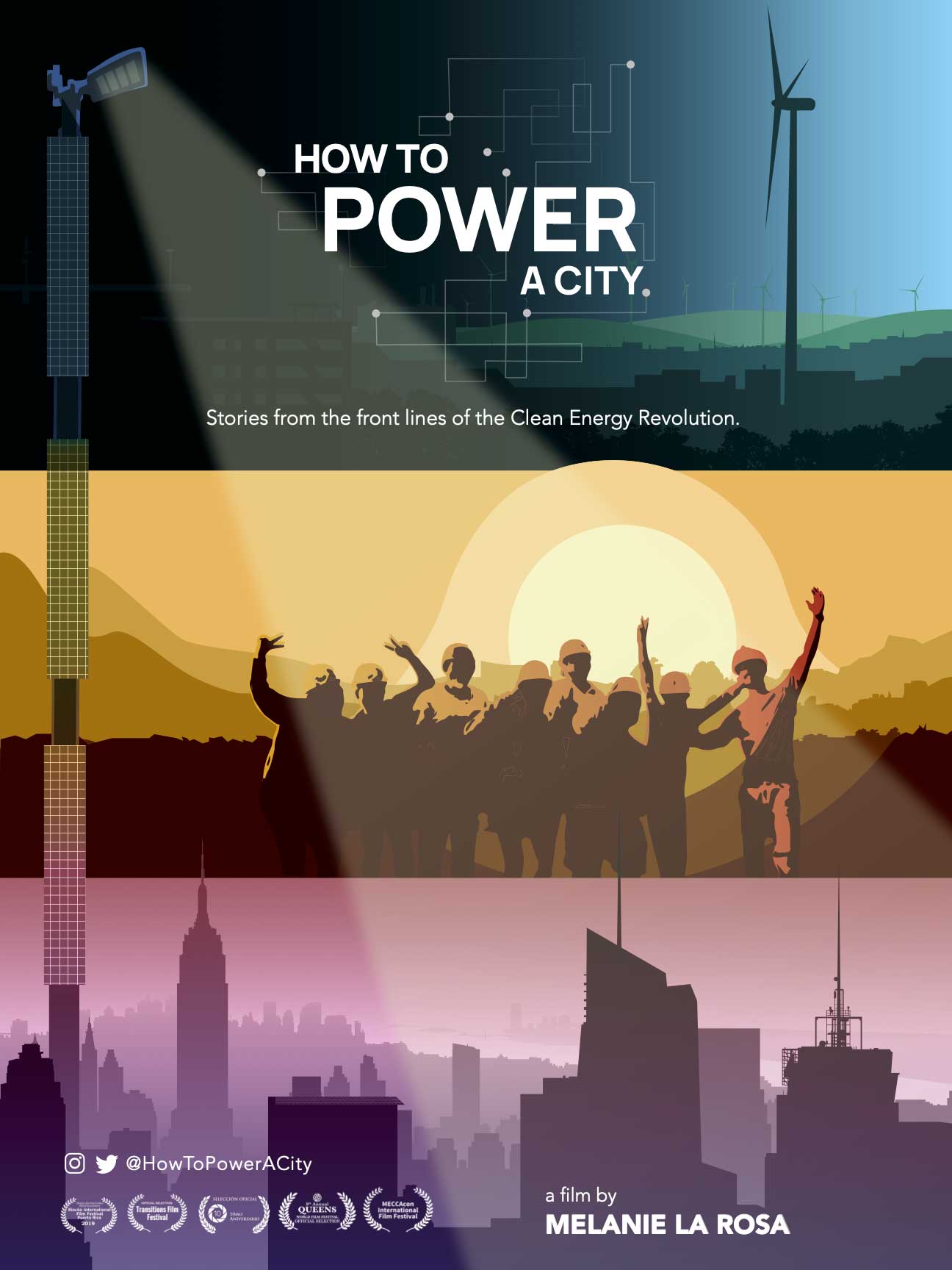How To Power A City
Film Screening & Ticket Information
When & Where to See this Film!
ENVIRONMENTALLY SPEAKING: 2 films about what’s happening.
April 27, 2024 @ 3:00PM • MoMI Redstone
Film Bloc Line Up:
Synopsis
Climate impact is worsening every year. Devastating storms, air pollution, sacrifice zones, and fossil fuel price hikes are the new normal. We know the problems of a fossil fuel economy — HOW TO POWER A CITY is a front-row seat to people finding solutions. A diverse cast in six locations each leads a unique solar or wind power project. They also find ways to use renewable energy to innovate, activate, and create community. This is a journey through the world of renewable energy: creating electricity without pollution, solar for surviving hurricanes, local climate action, and finding measures of environmental justice. It has themes of science, innovation, leadership, environmental stewardship, and love of one’s community.
Credits
Melanie LaRosa, Director, Solar Libre: Family Affair; How To Power A City: Highland Park; The Poetry Deal: a film with Diane di Prima
Melanie La Rosa, Writer
Melanie La Rosa, Producer
Toni de Aztlan, Producer
Leandro Fabrizi, Producer
Andres Otero, Producer
Natalie Lloyd, Producer
Kevin W. Walker, Music by
Kirsten L. Price, Music by
Benjamin Bode, Cinematography
Kyle I Kelley, Cinematography
Leandro Fabrizi, Cinematography
Kay Hannahan, Cinematography
George Heckard, Cinematography
Sydney T. Krantz, Graphics
Johanna Campos, Graphics
Director Statement
As a documentary filmmaker, I focus on stories reflecting positive social development. My films follow characters who confront issues affecting their lives, often taking brave actions and creating impact far beyond their own doorsteps. I see film as a tremendous catalyst for climate action. My hope with “How To Power A City” is to tap into the visual potential of film to help audiences see what energy transformation looks and feels like.
In “How To Power A City,” I was motivated by curiosity about clean and renewable energy and a deep commitment to environmental justice and restoration. I wanted to create a film that allows others with the same interest to understand firsthand and to hear from people who have found ways to bring clean energy to their communities. As climate change intensifies, energy issues are woven into all facets of addressing it. The people I followed in “How To Power A City” successfully found ways to use solar and wind power to do more than create electricity.
Finding accurate information is a significant challenge to adopting renewable energy, as is learning from personal and human-centered stories rather than policy or investment news. Science should not be political, but it is. Media about clean energy is perpetually politicized, and misinformation is growing. Myths fostered by the fossil fuel industry are deeply dug into public consciousness, even with volumes of evidence disproving them. The public suffers as much from the poor quality of our information as we do from the poor quality of our air.
In writing “How To Power A City,” I wanted to create a new narrative and followed a “solutions journalism” approach in which I looked at the solutions to the problems rather than the problems themselves. The dangers posed by climate change are well documented. We need to know about people enacting solutions.
“How to Power A City” is intended to take viewers on a journey to see how renewable energy works within and outside current energy systems. It combines character-driven, first-person perspectives, allowing the audience to see wind and solar projects up close and to understand from a more observant, less politicized perspective. In addition, audiences will hear directly from people successfully using solar and wind power and perhaps can use these stories to support their own approaches and get us out of the mess we have created with fossil fuels.
Director Biography
Melanie La Rosa is an award-winning filmmaker and educator. Her documentaries include the new feature “How To Power A City,” which follows individuals leading clean energy projects in six locations. She also authored a book based on the film, “Communities and the Clean Energy Revolution” (Lexington Books/Rowman & Littlefield, 2022). She is a 2022 Public Voices Fellow with the OpEd Project and the Yale Program on Climate Change Communications, and has won grants from the New York State Council on the Arts, the Periclean/Mellon Faculty Leadership Award, the Brooklyn Arts Council, the Queens Council on the Arts, The Puffin Foundation, the Yip Harburg Foundation, and the Solutions Journalism Network.
Melanie’s previous films include “Sir: Just A Normal Guy” (2001), which screened to acclaim at LGBTQ festivals around the world, and “The Poetry Deal: a film with Diane di Prima” (2011, 2021). “The Poetry Deal” was re-released 10 years after its original premiere, has aired in over 150 markets across the U.S., and will broadcast on public television through 2025.
Melanie teaches media production at Pace University, and holds an MFA in Film and Media from Temple University and a BA in Political Science from the University of Michigan. She splits her time between Queens, NYC and the rural mountains of upstate NY.


